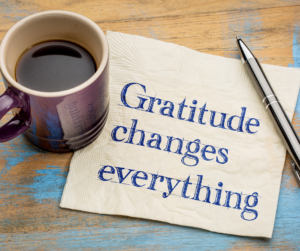Five Easy Ways to Practice Gratitude
 November is National Gratitude Month and it’s a perfect month for it since the major holiday of the month, Thanksgiving, is all about giving thanks. Being grateful not only for the big wins in life, but the small daily pleasures can help your senior enjoy the world around her even on days that are hard or if she’s not feeling well.
November is National Gratitude Month and it’s a perfect month for it since the major holiday of the month, Thanksgiving, is all about giving thanks. Being grateful not only for the big wins in life, but the small daily pleasures can help your senior enjoy the world around her even on days that are hard or if she’s not feeling well.
How Gratitude Helps Health
Finding the little moments to be thankful for can improve a person’s health. That’s because gratitude reduces depression and lessens stress, both of which can also create other health problems. Those with a grateful mindset also sleep better at night, another key factor for the body to remain healthy. All parts of the body are connected in many ways, so when one area is improved, it can then help others get better as well.
For seniors, learning to be grateful can be especially helpful regarding their health. Those little moments of gratitude can lessen chronic pain and provide the needed boost to encourage your loved one to continue taking more steps for better health. It can break a negative cycle that spins them down into feelings of hopelessness and isolation.
Gratitude Can be Learned
Even if you feel your elderly loved one is not very good at recognizing things to be grateful for or finding the bright moments in each day, you can help him become more grateful by working with him to practice gratitude regularly. Your loved one might need a little encouragement from you or his companion care at home provider in the beginning but it won’t be long before gratitude can be a part of every day for your elderly loved one.
Five Ways to Practice Gratitude
- Use a gratitude journal. For some, they like to wait until before bed to fill out three or four things that happened that day that they are grateful for. It can be a good way to help them sleep better by focusing on the positive moments of their day right before bed. Others may carry their journal with them throughout the day so they can jot it down in the moment.
- Have a gratitude jar. Have your loved one’s companion care at home provider help with this by finding an empty clear jar, and then creating strips of paper to write down blessings to put in that jar. It can be a great way for your loved one to start each meal.
- Go for gratitude walks. When your loved one’s companion care at home provider visits, they can go for walks and make a game out of pointing at things along the way that they are grateful for like the green grass, a lone daisy, or the sound of birds singing.
- Write thank you cards. Your loved one doesn’t need to wait until he receives a physical gift to write up a thank you letter. He can use every Friday to write one letter to someone in his life, thanking them for something he appreciates.
- Volunteer. Getting out and helping others is a wonderful way to remember to be thankful for what you have. It provides a needed service to others while also filling your loved one’s sense of gratefulness.
